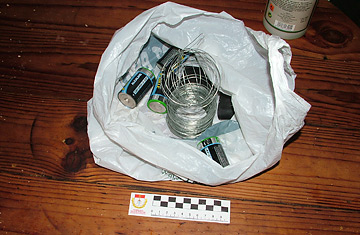
Bomb-making material is discovered in Barcelona.
Details surrounding the weekend bust of 14 suspected Islamist extremists in Barcelona are giving European security forces reason for concern — even beyond the evidence suggesting the group was working toward an eventual terror strike. Whereas radicals of North African origin have long been the main jihadist threat in Europe, Spanish authorities say 12 of the 14 men arrested Saturday are Pakistani. The reason that's so troubling, counterterrorism officials believe, comes with the considerable risk of two different arching lines eventually crossing: the fast-growing size of Pakistani communities on the continent, and their close ties to a homeland where Islamist radicalism is rampant.
"The concern across Europe is we'll soon be facing the same kind of threat Britain has been fighting for several years now," explains a French counterterrorism official, referring to Pakistani communities within the U.K. whose cohesion and relative insulation have inadvertently created niches for virulent extremist activity well hidden from outside eyes. "What this means is growing numbers of tightly knit Pakistani immigrants around Europe who maintain close and frequent contact with people back home. Against that background, the eventuality of surging radicalism in Pakistan spreading to Pakistanis communities in Europe is virtually a given."
Or even established fact. The July 7 London Underground and bus bombings that killed 52 people in 2005 provided proof of just how potent the terror collusion between extremists in Pakistan and ethnic Pakistani Europeans could be. But more piecemeal evidence that the same sort of cooperation has spread to the continent has largely escaped the attention of public opinion. The most recent example came with the Barcelona arrests, where raids on several apartments and mosques turned up materials such as timing mechanisms, ball bearings, and batteries that could have been used for building bombs. Spanish Interior Minister Alfredo Pérez Rubalcaba called the 14-member cell of 12 Pakistanis, an Indian, and Bangladeshi a "well-organized group that had gone beyond radicalization", and whose possession of apparent bomb-making equipment indicated that "violent acts are being planned."
Those Barcelona raids followed arrests in Germany last September, where a trio of radicals were caught with 1,500 pounds of explosive materials that were to be used in bombing strikes on U.S. military bases — primarily the Ramstein Air Force base — and Frankfurt airport. The operatives in that case underwent terror training in al-Qaeda-allied installations in Pakistan, and — similar to the 7/7 London bombers — got broad instruction shaping their terror plot from Pakistani mentors. Meanwhile, a French national, Willie Brigitte, who was arrested in Australia while allegedly canvassing a terror strike in 2003, received his training in a terror camp run by Pakistani jihadists. And as far back as December 2001, would-be shoe bomber Richard Reid relied on radical members of France's 50,000-member Pakistani community to prepare his attempt to bring down an American Airlines flight over the Atlantic.
As in France, the number of immigrant and ethnic Pakistanis in continental European countries is dwarfed by Britain's official total of nearly 750,000 (that 2001 census figure is, according to some experts, significantly higher today). But Pakistani communities are expanding rapidly in Europe — bringing with them the risk of radicals in their midst.
"There have been so many trails leading back to Pakistan when plots have been broken up or extremist groups uncovered that it has become second nature to look in that direction when trouble arises," says the French official — who nevertheless stresses that the terrorism emanating from jihadist groups in Algeria and Morocco remains the greatest threat to continental European countries today. "To their credit, the Pakistani security services have been good about cooperating with European counterparts to preempt radicals and plots who have come from Pakistan and turned up here."
Indeed, while this official could not confirm Spanish press accounts claiming that a tip-off from Pakistani intelligence about a known jihadist's arrival in Barcelona prompted the busts there, he says there are reasons to believe that sort of activist cooperation from Islamabad will continue. For one thing, in his opinion, Pakistani security services clearly have an interest in not seeing any instances of radical violence explode in Europe during this week's visit by President Pervez Musharraf.
What's more, both the Musharraf regime and al-Qaeda-linked extremists that Pakistani intelligence agencies are known to have aided in the past remain prime suspects in the assassination of Benazir Bhutto. Given such suspicions, the official says, Islamabad's reputation could use the restorative effects of helping to fight terror in Europe. "Let's be honest: news inside Pakistan over the past few months doesn't leave Western governments with lots of reasons to continue backing Musharraf," the French official concludes. "Awaiting clear signs of improvement at home, helping the West beat terrorism in its own backyard is the only card Musharraf has left to play."
